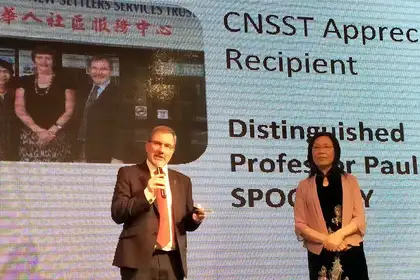
Distinguished Professor Paul Spoonley giving his acceptance speech at the awards, pictured with Jenny Wang, executive director of CNSST – an organisation supporting new Chinese migrants.
Sociologist Distinguished Professor Paul Spoonley has been given a special award by the Chinese community in recognition of his cultural and educational support.
Professor Spoonley, a renowned demographics researcher and media commentator on issues including immigration, population, employment, racism and race relations, was one of 10 individuals and organisations recognised by the CNSST Foundation (formerly known as the Chinese New Settlers Services Trust) for their support and contribution over the last two decades.
The organisation is a public trust that helps the Chinese community, especially the new immigrants, in various ways, including with English language acquisition, preparation for employment, educational courses and most recently, accommodation for elderly Chinese.
“It is now probably the largest Chinese organisation of its sort and provides an extensive range of services to the community,” says Professor Spoonley, who is Pro Vice-Chancellor for the College of Humanities and Social Sciences.
His award was in relation to his membership of one of their advisory boards, advising executive director Jenny Wang and her staff on trends and options, and the partnership between CNSST and the research organisation he leads:Capturing the Diversity Dividend of Aotearoa/New Zealand (CaDDANZ).
Professor Spoonley said the award, presented at a gala dinner in Auckland, was “a complete surprise and a real honour to be acknowledged in this way.”
“CNSST do some great work in the Chinese community but they do much more – they build stronger and better-connected communities, and not just with their own community,” he says. “It’s been a lot of fun working with them and also inspiring – a community helping its own to settle in New Zealand.”